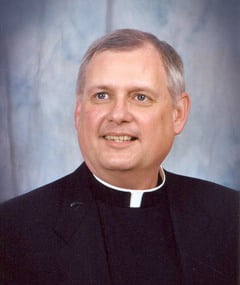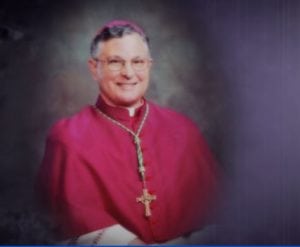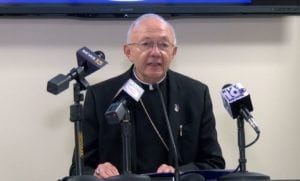For 24 years following an accusation of sexual abuse, a Lafayette priest continued to serve in ministry and has even held a high rank in the Diocese of Lafayette. A woman claims she was abused by Msgr. Robie Robichaux starting in 1979 when she was 16 years old and told the church on at least three different occasions. Robichaux has been removed from his position as Judicial Vicar and placed on administrative leave, according to a letter sent to members of clergy.

“I acted as quickly as possible in accordance with respect for justice and concern for the person who brought the complaint to our attention,” said Bishop J. Douglas Deshotel in a news conference Monday. Deshotel said he found out about the allegation on September 18, 2018.
“I am releasing this information in conjunction and with the assistance of the complainant. I thank her for her courage in coming forward and assisting us in this investigation,” said Deshotel.
The initial complaints
According to the diocese, allegations against Robichaux were first reported to the church in 1994.
“In 1994, the matter was handled according to the protocols in place at that time,” said Bishop Deshotel. The complaint was made before the adoption of the Charter for the Protection of Children and Young People by the US Conference of Catholic Bishops. It is unclear what those protocols were or if any action was taken in 1994.
“The Charter and Norms established a ‘zero tolerance’ policy, prohibiting a cleric against whom a credible allegation of sexual abuse of a minor was made to remain in ministry,” said Deshotel. These policies were established by the church in 2002.
But Robichaux’s accuser also came forward in 2004. In a notarized statement, she requested that Msgr. Robichaux be removed from ministry, citing “zero tolerance”.
Canon law vs. state law
Because the victim was 16 years old at the time of the alleged abuse, in 2004 former Bishop Michael Jarrell sought advice from the Congregation for the Doctrine of the Faith about whether she was considered a minor or an adult.

Under canon law, in 1979 someone who was 16 years old was considered an adult in the eyes of the church; under state law she would have been considered a minor. In 1994, canon law was changed so that anyone under the age of 18 was considered to be a minor. Church officials reportedly reasoned that because canon law in 1979 assumed the victim was an adult, there was nothing that could be done.
“The matter also should have been referred to the layperson sexual abuse review board, which was standard practice at the time according to the Charter and the Norms, to advise [Bishop Jarrell] whether or not Monsignor Robichaux would have been suitable for ministry,” said Deshotel.
It’s unclear if the diocesan review board was consulted in 2004.
Unanswered questions

The bishop would not take questions following Monday’s news conference, instead members of the media were asked to submit questions via e-mail.
Among our questions for the diocese: Was Bishop Jarrell’s response in 2004 appropriate? Does canon law supersede state law? Has law enforcement been notified?
“Thanks to everyone for following up with your questions for Bishop Deshotel,” said communications director Blue Rolfes in an e-mail following Monday’s news conference. “We are working to answer as many as possible, as quickly as possible, and we ask your patience as we continue to do that.”

